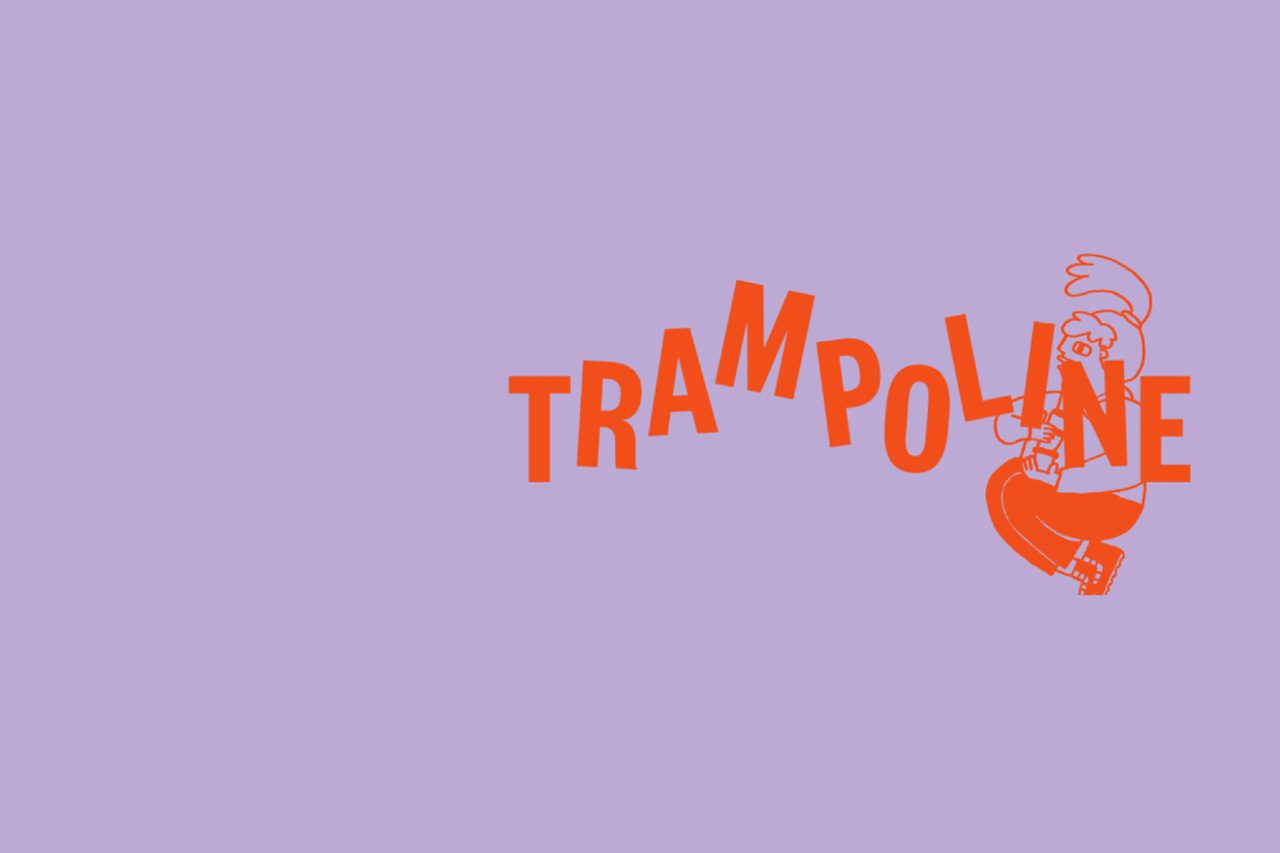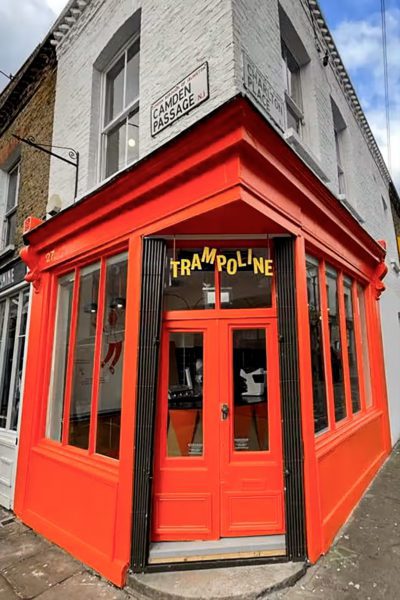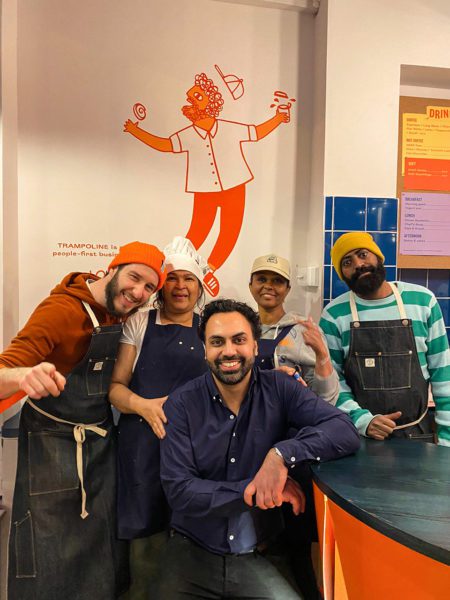Swedish Disruptor Shakes Up Asia’s Paint Industry
A bold, eco-conscious brand is drawing in a new generation of consumers
A profile of London-based TRAMPOLINE

“We must change our mindset: every refugee and migrant, whatever the country of origin, is a resource for our community. We believe refugees contribute to inclusive growth and we welcome them.”
— Pranav Chopra, Founder, TRAMPOLINE
FFrom a bright red little corner shop, tucked between Angel’s antique stores in North London, Lidia serves coffee with a side of hope and opportunity – something she never had in her home country.
At age 35, Lidia fled Eritrea, a small North African country which has been ruled by an oppressive dictator since it gained independence almost thirty years ago. The country has no legislature, no independent judiciary or media outlets, and no independent civil society organizations. Elections have not been held for nearly three decades and the government has failed to implement a constitution guaranteeing civil rights for its population.
Longing for safety and freedom, Lidia had no choice but to leave.
 An uncertain and difficult journey brought her to London — a city that twinkles with opportunity from a distance, yet with dark and cold streets that tell refugees a different story up close.
An uncertain and difficult journey brought her to London — a city that twinkles with opportunity from a distance, yet with dark and cold streets that tell refugees a different story up close.
For the first three months, Lidia was unemployed and homeless: a classic and desperate Catch 22 fueled by immigration policies of UK government. Without a job, Lidia explained, it is difficult to find housing. But without a safe place to live, it is equally difficult to find and hold down a job, presenting a daily struggle for the roughly 200,000 refugees and asylum seekers in the UK today.
With a helping hand from Passage, an organization that addresses homelessness, Lidia met Pranav Chopra last November. Chopra is founder of NEMI Teas and TRAMPOLINE, the little corner café where he employs refugees, like Lidia, providing a stable income and valuable hospitality training until they are ready to take the next step in their careers.
Chopra, born in India and raised in New Zealand, founded NEMI Teas with the intention to supply ethically sourced tea to corporate customers, while also addressing the employment and integration struggles faced by refugees in the UK.
Basic services like housing, healthcare, access to bank accounts and education are often out of reach – either by law or simple logistics – for those who have fled their home countries for England. Accommodation provided by the Home Office, for example, always changes location, making it nearly impossible for refugees to find stability and set up the foundations of their new life, whether it’s a job or childcare.
Basic services like housing, healthcare, access to bank accounts and education are often out of reach – either by law or simple logistics – for those who have fled their home countries for England.
If people could gain some work experience, build credibility, and create connections that could offer reference checks, Chopra thought, maybe they could break the negative cycle.
And so, in 2017, NEMI Teas was born. The business model was to provide specialty tea at the wholesale level. They focused on large corporates, where consumption is high, to enable the company to reach scale and create more jobs for refugees. Fifty per cent of profits were dedicated to support refugee training and forge recruitment partnerships.
Until 2020, business was good.
But then, the Covid-19 pandemic struck NEMI Teas like it did so many small businesses around the world. The first lockdown wiped out 95% of NEMI’s business overnight as people worked from home and corporate clients canceled orders.
Rather than laying off the recently hired refugees, Chopra decided to place them at several partner cafes where they continued to get trained and upskilled in a café environment.
However, rather than laying off the recently hired refugees, Chopra decided to place them at several partner cafes where they continued to get trained and upskilled in a café environment. Within 3-6 months of training, Chopra then moved the trainees into full-time employment with larger organizations such as National Theatre.

Pranav Chopra and the Trampoline Team
This was the birth of the new concept: TRAMPOLINE, the café where Lidia is training to be a hospitality professional.
Chopra has now officially partnered with a well-known catering set-up Thomas Franks, and The Hotel School “to provide a holistic route from gaining refugee status to meaningful employment and a place in our proudly multicultural community,” all while serving ethically sourced coffees and teas.
Today, TRAMPOLINE employs six refugees from three countries, giving them a jumpstart on their new lives in England. The vision is to train 24 in the next year. Trampoline was incubated with funding from UnLtd, Postcode Innovation Trust (80%), awards, grants, and the entrepreneur’s own investment.
Chopra’s long-term vision is to help lower the unemployment level amongst the refugee community in the UK, which currently sits at over four times than the national average.
One day, Lidia hopes to open her own coffee shop or restaurant serving Ethiopian and Eritrean food. “I would like people to try different types of food from other parts of the world,” she said.
“It will be a new beginning.”
Related Content
Comments
Deep Dives

Featuring
Clarisse Awamengwi
IE Correspondent
July 17 - 12:00 PM EST

Featuring
Russell McLeod
July 24 - 12:00 PM EST
RECENT
Editor's Picks
Webinars
News & Events
Subscribe to our newsletter to receive updates about new Magazine content and upcoming webinars, deep dives, and events.
Become a Premium Member to access the full library of webinars and deep dives, exclusive membership portal, member directory, message board, and curated live chats.
At Impact Entrepreneur, we champion fearless, independent journalism and education, spotlighting the inspiring changemakers building the Impact Economy. Diversity, equity, sustainability, and democracy face unprecedented threats from misinformation, powerful interests, and systemic inequities.
We believe a sustainable and equitable future is possible—but we can't achieve it without your help. Our independent voice depends entirely on support from changemakers like you.
Please step up today. Your donation—no matter the size—ensures we continue delivering impactful journalism and education that push boundaries and hold power accountable.
Join us in protecting what truly matters. It only takes a minute to make a real difference.
0 Comments